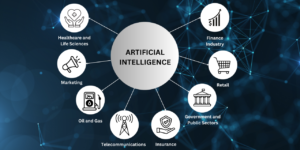As the world grapples with the rapid advancements in artificial intelligence (AI), Microsoft co-founder Bill Gates has emerged as a thought leader, sharing his insights on the transformative journey from Artificial Narrow Intelligence (ANI) to Artificial General Intelligence (AGI). In this article, we delve into Gates’ perspective on the current benefits of ANI, the potential of AGI, and the ethical considerations that must guide the development of these disruptive technologies.
Key Takeaways
- Bill Gates, the co-founder of Microsoft, provides thoughtful insights on the evolution of AI, from Artificial Narrow Intelligence (ANI) to Artificial General Intelligence (AGI).
- Gates highlights the current strengths of ANI and the potential of AGI to revolutionize industries, including software engineering.
- The importance of ethical considerations and regulatory frameworks is emphasized to ensure responsible AI development and adoption.
- Gates envisions a future where AI agents become a game-changer in software interactions, providing personalized experiences and enhanced productivity.
- Challenges and opportunities in AI development, such as privacy concerns, interoperability, and industry transformation, are discussed.
The Current Landscape of AI: Artificial Narrow Intelligence
As the world increasingly embraces the transformative power of artificial intelligence (AI), it is essential to understand the current landscape and the different forms this technology can take. One of the most prominent manifestations of AI is Artificial Narrow Intelligence (ANI), a specialized system that excels at performing specific tasks with remarkable efficiency and precision.
Understanding Artificial Narrow Intelligence (ANI)
ANI refers to AI systems that are designed to excel in a single, well-defined domain, such as virtual assistants, recommendation engines, or image recognition software. These systems leverage advanced machine learning algorithms and data analysis to automate tasks, enhance decision-making, and provide personalized user experiences. While ANI systems may exhibit remarkable capabilities within their designated areas, they lack the ability to generalize their knowledge or perform beyond their intended functions. newsreporto
Examples of ANI in Action
Some of the most common examples of ANI in action include virtual assistants like Siri, recommendation engines used by e-commerce giants like Amazon, and image recognition software employed in security systems. These AI-powered tools leverage the strengths of artificial narrow intelligence to streamline operations, improve productivity, and offer tailored solutions to users.
Bill Gates’ Perspective on ANI’s Impact
Microsoft co-founder Bill Gates has recognized the significant role that artificial narrow intelligence plays in driving innovation and productivity across various sectors. Gates emphasizes how ANI systems can automate tasks, enhance decision-making, and provide personalized experiences, ultimately improving efficiency and boosting overall productivity. As the world continues to embrace the power of AI, understanding the current capabilities and limitations of ANI systems is crucial in navigating the future of technology.
The Promise of Artificial General Intelligence (AGI)
As the AI landscape evolves, the vision of Artificial General Intelligence (AGI) has emerged as a profound possibility. Unlike Artificial Narrow Intelligence (ANI), which excels in specific domains, AGI is envisioned as possessing human-like intelligence, capable of understanding, learning, and applying knowledge across a wide range of tasks.
Defining Artificial General Intelligence
Artificial General Intelligence (AGI) represents the ambitious goal of creating AI systems that can match or even surpass human-level intelligence. These systems would be able to tackle complex problems, reason abstractly, and adapt to new situations without the need for human intervention. This level of adaptability and problem-solving capability has the potential to revolutionize industries and address some of the most pressing global challenges facing humanity.
AGI’s Potential to Revolutionize Industries
According to Bill Gates, the co-founder of Microsoft, the realization of AGI could “utterly change how we live our lives, online and off.” With the ability to understand, learn, and apply knowledge across diverse domains, AGI is expected to drive transformative changes across a wide range of industries, from healthcare and education to manufacturing and transportation. By leveraging human-level intelligence, problem-solving, and adaptability, AGI could unlock unprecedented solutions to complex challenges, elevating human capabilities and driving unprecedented industry transformation.
Navigating the Future: Bill Gates on AI’s Role in Software Engineering
Gates’ Balanced Approach to AI Development
Bill Gates, the co-founder of Microsoft, underscores the need for a balanced approach in AI development. As a prominent tech visionary, Gates recognizes the current benefits of Artificial Narrow Intelligence (ANI) while also preparing for the future implications of Artificial General Intelligence (AGI). This balanced perspective is crucial as the software engineering industry navigates the evolving landscape of AI and its impact on software development.
Maximizing ANI’s Strengths in Software Engineering
Gates suggests that the software engineering community should focus on maximizing the current strengths of ANI to enhance productivity and efficiency. ANI excels in specialized domains, such as data analytics, cybersecurity, and customer service, where it has driven significant operational efficiency and innovation. By strategically integrating these ANI capabilities, software engineers can unlock new levels of productivity and competitiveness in their projects and organizations.
Preparing for AGI’s Impact on Software Development
While maximizing the current benefits of ANI, Gates also emphasizes the importance of preparing for the future impact of AGI on the software engineering industry. AGI, with its potential to mimic human-level intelligence, could revolutionize the way software is developed, tested, and deployed. As the industry evolves, software engineers must stay ahead of the curve by continuously learning, upskilling, and adapting to the changing employment landscape influenced by AI advancements.

Ethical Considerations and Regulatory Frameworks
As the development of artificial intelligence (AI) technology rapidly advances, Bill Gates emphasizes the crucial need for robust ethical standards and regulatory frameworks to manage the transition from Artificial Narrow Intelligence (ANI) to Artificial General Intelligence (AGI) responsibly. With the potential for AI to transform industries and significantly impact our daily lives, ethical considerations and responsible AI development have become paramount.
The Importance of Ethical Guidelines for AI
Gates underscores the importance of establishing clear ethical guidelines to ensure AI systems are developed and deployed in alignment with human values and societal well-being. Ethical considerations around AI must address vital issues such as data privacy, data management, algorithmic bias, and the societal impact of AI applications. By proactively addressing these concerns, the AI community can work to build responsible AI development practices that prioritize transparency, accountability, and the protection of individual rights.
Regulatory Measures for Responsible AI Adoption
Alongside ethical guidelines, Gates emphasizes the need for comprehensive AI regulations to govern the development and deployment of AI technologies. The European Union’s AI Act, for instance, aims to be the world’s first comprehensive AI law, classifying AI systems into different risk categories and imposing compliance requirements on providers. These regulatory measures, such as mandatory AI system registration and post-market monitoring, are designed to mitigate potential risks and promote responsible AI adoption.
As the AI landscape continues to evolve, the adoption of ethical principles and regulatory frameworks will be crucial for unlocking the full potential of these transformative technologies while safeguarding individual rights, promoting transparency, and ensuring the long-term societal benefits of AI.

AI-Powered Software: Envisioning the Future
As technology continues to evolve, the landscape of software development is undergoing a remarkable transformation, driven by the rapid advancements in artificial intelligence (AI). According to Microsoft co-founder Bill Gates, the future of software interactions will be defined by the emergence of AI agents – a game-changing development that promises to revolutionize how we engage with digital tools and applications.
AI Agents: A Game-Changer in Software Interactions
Gates envisions a future where AI agents, a new type of software, will be able to process natural language and accomplish a wide range of tasks on our behalf. These AI agents will learn about our personal preferences, work habits, interests, and daily routines, allowing them to streamline our interactions with various software applications and automate mundane tasks. By leveraging natural language processing and task automation capabilities, AI agents will enable us to simply speak or type our requests, and they will handle the necessary actions, delivering personalized experiences tailored to our unique needs.
Personalized Experiences with AI-Driven Software
The integration of AI-powered software will pave the way for more personalized and efficient experiences. As AI agents gather and analyze data about our individual preferences and behaviors, they will be able to anticipate our needs, provide customized recommendations, and automate repetitive tasks. This level of personalization will not only enhance our productivity but also enrich our overall software interactions, allowing us to focus on the most meaningful aspects of our work and personal lives.
Bill Gates’ vision for the future of software development underscores the transformative potential of AI-powered software, where AI agents will become the cornerstone of seamless and personalized interactions. As we navigate this exciting frontier, it is crucial to address the ethical considerations and regulatory frameworks that will shape the responsible development and integration of these advanced technologies.
Challenges and Opportunities in AI Development
As the field of AI continues to evolve, it is essential to address the various challenges and opportunities that come with its rapid advancements. One key concern is the issue of privacy and data management. With AI systems becoming increasingly sophisticated in their ability to gather, process, and utilize personal data, there is a growing need for robust regulatory frameworks to ensure the protection of individual privacy and the responsible use of data.
Privacy and Data Management Concerns
The exponential growth in data generation and the reliance on complex algorithms to extract insights from this data have raised significant privacy concerns. As AI agents become more integrated into our daily lives, there is a heightened risk of sensitive personal information being collected, analyzed, and potentially misused. Addressing these data management challenges will require innovative solutions and close collaboration between policymakers, technology companies, and the public.
Interoperability and Standardization Challenges
Another pressing issue in the AI development challenges is the need for interoperability and standardization across AI systems and applications. The lack of universal standards and protocols can hinder the seamless integration of AI solutions, limiting their scalability and effectiveness. Establishing consistent regulatory frameworks and industry-wide guidelines will be crucial in fostering a more cohesive and collaborative AI ecosystem.
As the world grapples with the transformative potential of AI, it is clear that navigating these privacy concerns, data management issues, and interoperability challenges will be critical in shaping the responsible and equitable development of this transformative technology. By addressing these complexities, we can unlock the vast opportunities that AI holds for enhancing productivity, efficiency, and societal well-being.

The Role of AI in Transforming Industries
As Bill Gates highlights, AI has the potential to “utterly change how we live our lives, online and off,” with the ability to revolutionize industries and transform how we interact with technology. The rapid advancements in AI systems towards enhanced capabilities, customization, and seamless integration into daily life are poised to disrupt various sectors, paving the way for innovative solutions and improved productivity.
AI’s Disruptive Potential across Sectors
The evolution of AI towards multimodality, enabling the processing of speech, images, and video for more intuitive interactions, is set to redefine the user experience across diverse industries. From personalized product recommendations to intelligent workflow management, the integration of AI with personal data can empower highly customized assistants to proactively serve user needs. The concept of AI agents managing tasks through natural language instructions has the potential to boost productivity and efficiency, revolutionizing how we approach both digital and physical tasks.
Enhancing Efficiency and Decision-Making with AI
The increased focus on advanced robotics, combined with the advancements in AI software, is expected to accelerate the automation of physical tasks by effectively integrating intelligent systems with capable hardware. This integration holds the promise of enhancing efficiency and streamlining operations across industries, from manufacturing to logistics. Additionally, the reliability and customizability of AI models like GPT are anticipated to improve significantly, enabling more accurate and personalized decision-making support for businesses and individuals.
| Key AI Transformation Trends | Potential Impact |
|---|---|
| Multimodal AI for enhanced user interactions | Personalized experiences, improved productivity |
| Intelligent AI agents for workflow management | Increased efficiency, streamlined operations |
| Advancements in AI-powered robotics | Automation of physical tasks, enhanced productivity |
| Improved reliability and customizability of AI models | More accurate and personalized decision-making support |
As the AI transformation continues to unfold, industries across the spectrum are poised to experience disruptive changes, driving increased efficiency, enhanced decision-making, and innovative solutions that reshape the way we live and work.
Bill Gates’ Vision for the Future of AI
Aligning AI Development with Societal Goals
As a visionary in the tech industry, Bill Gates recognizes the immense potential of artificial intelligence (AI) to reshape our world. He envisions AI agents as the next revolutionary computing platform, akin to the rise of the personal computer in the 1970s and the internet boom in the 1990s. Gates anticipates the evolution of these AI agents into entities capable of offering hyper-personalized experiences, streamlining software creation, and enabling developers to craft applications that learn and adapt without constant updates.
Responsible Innovation and Collaborative Efforts
However, Gates also emphasizes the critical need for proactive measures to manage the development of Artificial General Intelligence (AGI) responsibly. He advocates for clear policies on data ownership, use, and sharing to ensure users maintain control over their personal information, as AI becomes more integrated into daily life. Additionally, Gates highlights the importance of educational reforms and training programs to prepare the workforce for an AI-centric economy.
Recognizing the potential challenges and societal implications of AI, Gates calls for collaborative efforts and responsible innovation. He believes that by aligning AI development with human values and societal goals, we can harness the transformative power of this technology to address global challenges and enhance the human experience. Through a balanced approach, Gates envisions a future where AI and human expertise work in harmony, driving progress and innovation for the benefit of all.
The Human Element in AI-Powered Software
As AI-powered software becomes increasingly prevalent, it’s crucial to strike a delicate balance between the capabilities of artificial intelligence and the expertise of human professionals. Bill Gates emphasizes that while AI holds immense potential, the human element remains indispensable in shaping the future of software development.
Striking a Balance between AI and Human Expertise
Gates suggests that the key lies in harnessing the strengths of both AI and human intelligence. While Artificial Narrow Intelligence (ANI) excels at specific tasks, Artificial General Intelligence (AGI) holds the promise of revolutionizing the software industry. However, Gates cautions against over-reliance on AI, underscoring the need to maintain a collaborative approach where humans and machines work in tandem.
Upskilling and Adapting to AI-Driven Changes
As AI-powered software becomes more prevalent, software engineers and developers must adapt to the changing landscape. Gates emphasizes the importance of upskilling and continuous learning to stay ahead of the curve. By embracing human-AI collaboration, professionals can leverage the balance of AI and human expertise to drive innovation, improve productivity, and enhance the overall software engineering process.
The transition to an AI-powered future requires a delicate balance, one that Gates believes can be achieved through a comprehensive approach. By upskilling and adapting to AI-driven changes, the software industry can harness the best of both worlds, unlocking new avenues for software engineering and productivity.
FAQ
What is Artificial Narrow Intelligence (ANI)?
Artificial Narrow Intelligence (ANI) refers to AI systems that are specialized in performing a single task. Examples include virtual assistants like Siri, recommendation engines used by Amazon, and image recognition software in security systems. ANI excels in specific domains but lacks the ability to generalize knowledge or perform beyond its designated tasks.
What is Artificial General Intelligence (AGI)?
Artificial General Intelligence (AGI) is envisioned as AI with the ability to understand, learn, and apply knowledge across a wide range of tasks, similar to human intelligence. Unlike ANI, AGI would be capable of performing diverse tasks, reasoning, and adapting to new situations without human intervention.
What is Bill Gates’ perspective on the development of AI?
Bill Gates underscores the need for a balanced approach in AI development. He suggests focusing on maximizing the current benefits of ANI while preparing for the future implications of AGI. Gates calls for robust ethical standards and regulatory frameworks to manage the transition from ANI to AGI responsibly, emphasizing the importance of mitigating potential risks and maximizing benefits.
How does Bill Gates envision the future of AI-powered software?
Gates envisions a future in which you would have an AI agent, a type of software that is able to process and respond to natural language and accomplish a variety of tasks. You would simply ask your AI agent to do something, and it would be able to do things for you based on information you’ve shared about your work, personal life, interests, and preferences. Gates anticipates the need for a new kind of database to enable the AI agent to store, retrieve, and build upon the information it learns about you without sacrificing your privacy.
What are Bill Gates’ thoughts on the impact of AI on our lives?
Gates believes that AI will “utterly change how we live our lives, online and off,” with the potential to revolutionize industries and transform how we interact with technology. He advocates for proactive measures to manage AGI’s development responsibly, ensuring it aligns with human values and benefits society.

